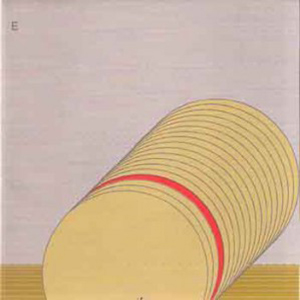 Down to the final three releases in Die Stadt and Auf Abwegen’s expansive reissue program, E is a collaborative album originally issued on the Dom label in 1988. Having moved past his synth heavy industrial din but before fully embracing avant garde experimental sounds, it is a transitional record that hints at late 1980s digital synth pop, as well as pure dissonance. At times it may seem a bit too dated by the technology used, but as a whole the album is another strong entry in Tietchens' catalog.
Down to the final three releases in Die Stadt and Auf Abwegen’s expansive reissue program, E is a collaborative album originally issued on the Dom label in 1988. Having moved past his synth heavy industrial din but before fully embracing avant garde experimental sounds, it is a transitional record that hints at late 1980s digital synth pop, as well as pure dissonance. At times it may seem a bit too dated by the technology used, but as a whole the album is another strong entry in Tietchens' catalog.
Tietchens and Bekker (who appeared on most of Tietchens' releases, but not credited as an equal partner) not only have a transitional sound on E, but it also features liberal application of Tietchens' more playful and absurd side.The album's high point in my opinion, "Musik Im Deutschen Imbiss," begins with plucked strings and percussive sounds that reek of late 1980s digital synth technology.Where it excels is that it begins sounding like a TV sitcom opening theme, transitions into a passage of simulated gunfire and screams, and then back again.It is an odd, and slightly disturbing juxtaposition.
"Patterns" is another piece where the sound is a bit more surreal and in this case playful.The opening wood block percussion is oddly non-electronic in sound, but has the complexity of something programmed, rather than played.After about the halfway point, a jaunty bit of organ is added to the mix, resulting in an strange paring of sounds and more than just a bit of silliness.
At times, however, it is difficult to tell what is supposed to be absurdism and what is just the side effect of heavily dated technology.The canned string sounds of "Kinematograph" and stiff piano hint at a dramatic sense of tension, but those basic sounds just never quite get it there.The heavy use of digital synth horns and sounds on "Zu Traurigem Behuf" are intended to convey sadness I would assume, but the canned nature of the sounds feel cliché and insincere.
Of course Tietchens and Bekker push the experimental envelope as well, and in some unexpected ways."Studie für Bassklarinette und Zuspielband" has some uncharacteristic squawking jazz moments via the clarinet, but it is also played in ways that more appropriately sound like shrill sirens and droning fog horns.Compared to much of his work it is rather organic, with the only overt electronics being the subtle, manipulated backing tape."Sphinkter" is a short bit of skittering noises and strange filtering that has the chiptunes sound, but predates that movement by a few decades.
Like most of these reissues, there is some additional previously unreleased material included.Of these two songs, "You Get What You Hear" is a short piece of weird spoken voices, clattering noises and heavily rumbling bass.It harkens back to Tietchens' work for the Discos Geometricos label, but even a bit more bizarre."Abendliche Stimmen" is more unsettling, resembling heavily processed and treated bits of chorus vocals bent and pulled into something completely sinister.They may be recorded during the same era, but both pieces have a distinctly different character to them that would have been out of place on the album proper.
The very obvious moments of General MIDI level sounds that appear on some of the pieces throughout E may have had an unintended effect on me, as I felt that, 25+ years later, the sound was more silly and quaint rather than daring.But even with that excluded, the remaining, more experimental pieces stand up with any of Tietchens' best work.While I have always favored his more industrial sounds and thus I found myself enjoying those pieces the most on here, the whole disc is a great one.
samples:
 
Read More

